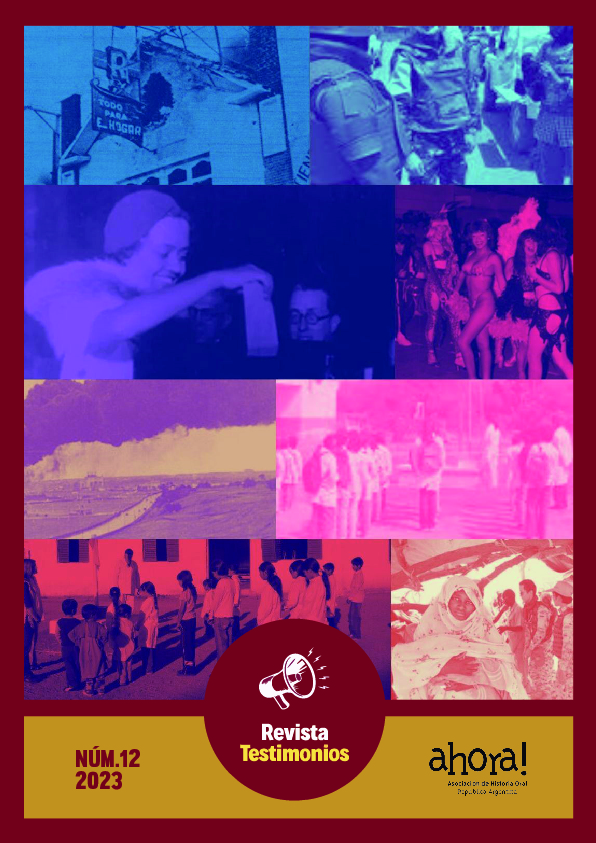30 years after the rwandan genocide: the experience of uruguayan peacekeepers
Keywords:
Rwanda, Genocide, UNAMIR, Uruguay, United Nations peacekeeping operationsAbstract
The objective of this article is to recover the military experience of nine Uruguayan peacekeepers during the Rwandan genocide of 1994. We present historical aspects of the conflict and the biographical experience of the Uruguayan military in the United Nations Assistance Mission in Rwanda (UNAMIR), aiming to provide a first-person perspective to one of the bloodiest events in history. In 2023, we interviewed nine military observers who were sent to Rwanda at the end of 1993, eight of them who were present in the country when the genocide broke out and decided to remain there until the end of the mission (one of them, Gral. Fígoli finished his mission in February of 1994). In addition to providing an unusual perspective of the genocide, such as that of the Uruguayan “blue helmet”, the participant’s testimonies allow us to understand more in depth the negative judgment that has been made of the UNAMIR mission at the international level.
References
Autessere, Séverine. 2019. “The crisis of peacekeeping: Why the UN can’t end wars”, Foreign Affairs. En: https://www.foreignaffairs.com/crisis-peacekeeping. Disponible en Julio de 2024.
Berry, Mary. 2015. “From violence to mobilzation: Women, war and threat in Rwanda”, Mobilization: And International Quarterly, 20, núm. 2, pp. 135-156. https://doi.org/10.17813/1086-671X-20-2-135
Bornat, Joanna. 2004. “Oral history”. En Qualitative Research Practice, de Clive Seale, Giampetrio Gobo, Jaber F. Gubrium y David Silverman, pp. 34-47, Sage Publications, Londres.
Brown, Daniel. 2017. Historia de paz y Guerra: Testimonios de uruguayos en misiones de paz, Ediciones de la Plaza, Montevideo.
Dellaire, Romeo. 2019. Shake Hand with the Devil: The failure of humanity in Rwanda, Vintage Canada, Toronto.
Field, Sean. 2009. “El genocidio ruandés de 1994: Recordando e imaginando a través de los límites de tiempo, espacio y palabras”, Testimonios, año 1, núm.1, pp. 1-22.
Fontana, Andrea, y James Frey. 2005. “The interview: From structured questions to negotiated text”. En Collecting and interpreting qualitative material, de Norman K. Denzin e Yvonna S. Lincoln, pp. 61-106, Sage, Thousand Oaks, California.
Fujii, Lee Ann. 2009. Killing Neighbors: Webs of Violence in Rwanda, Cornell University Press, Ithaca.
Gourevitch, Philip. 2009. Queremos infromarle que mañana seremos asesinados con nuestras familias: Historia de Ruanda, Debate, Madrid.
Greal, Chris Mc. 2017. “What's the point of peacekeepers when they don't keep the peace? From Rwanda to Bosnia, Haiti to Congo, failures raise questions about future of United Nations blue helmets”, The Guardian. https://www.theguardian.com/world/2015/sep/17/un-united-nations-peacekeepers-rwanda-bosnia. Disponible en julio de 2024.
Guyer, Julián González. 2014. “La contribución de Uruguay para operaciones de paz de Naciones Unidas: acerca de las motivaciones y la interpretación de su record”, Revista Uruguaya de Ciencia Política, 23, núm. 1, pp. 41-72.
Hatzfield, Jean. 2005. Machete season: The killers in Rwanda speak, Nueva York, Farrar, Straus and Giroux.
Hintjens, Helen M. 1999. “Explaining the 1994 genocide in Rwanda”, The Journal of Modern African Studies, 37, núm. 2, pp. 241-286.
Hughes, Declan. 2011. “Oral History and the United Nations Force In Cyprus”, Royal United Services Institute of Vancouver Island (RUSI-VI), http://rusiviccda.org/wp-content/uploads/2012/02/Oral_History_and_the_United_Nations_Force_In_Cyprus.pdf. Disponible en julio de 2024.
Janesick, Valerie J. 2007. “Oral History as a Social Justice Project: Issues for the Qualitative Researcher”, Qualitative Report, 12, núm. 1, pp. 111-121. https://doi.org/10.46743/2160-3715/2007.1648
Kuperman, Alan J. 2000. “El genocidio de Ruanda, una reconsideración”, Politica Exterior, núm. 74, pp. 131-150.
Lakin, Samantha. 2019. Lessons from the UN peackeeping mission in Rwanda, 25 years after the genocide it failed to stop. https://theconversation.com/lessons-from-the-un-peacekeeping-mission-in-rwanda-25-years-after-the-genocide-it-failed-to-stop-122174. Disponible en julio de 2024.
Lau, Carmen A. 2019. Stories from Rwandan Churches Prior to the Genocide: A Collection of Oral Histories. Tesis de maestría, University of Alabama-Birmingham. https://digitalcommons.library.uab.edu/cgi/viewcontent.cgi?article=3221&context=etd-collection.
Leavy, Patricia. 2011. Oral history: Understanding Qualitative Research, Oxford University Press, Oxford.
Martinez, Elias David Morales, y Marina Luizato. 2011. “Análise do papel da UNAMIR e sua incongruência na Guerra Civil de Ruanda (1993-1996)”, Conjuntura Global, 11, núm. 2, pp. 41-59. http://dx.doi.org/10.5380/cg.v11i2.84635
Melvern, Linda. 2014. “United Nations Assistance Mission for Rwanda II (UNAMIR II)”. En The Oxford Handbook of United Nations Peacekeeping Operations, de Joachim A. Koops, pp. 473-483. Oxford Academic, Oxford.
Miller, Donald. 2020. Becoming Human Again: An oral history of the Rwanda Genocide Against the Tutsi, University of California Press, Berkley.
Montalvo, D. A. J. (2015). Análisis Social de un Genocidio: Ruanda 1994. Conjuntura Global, 4(2), 236-249. DOI: http://dx.doi.org/10.5380/cg.v4i2.43177
Muton, Jean Denis. 1994. “La crise rwandise de 1994 et les Nations Unies”, Annuaire francais de droit international, 40, núm.1, pp. 214-242. https://doi.org/10.3406/afdi.1994.3190
Newbury, Catherine. 1998. “Ethnicity and the Politics of History in Rwanda”, Africa Today, 45, núm. 1, pp. 7-24. https://www.jstor.org/stable/4187200
Palys, Theodore Stephen, y Chris Atchison. 2014. Research decisions: Quantitative, qualitative, and mixed method approaches, Nelson Education, Toronto.
Prunier, Gerard. 1991. The Rwanda crisis: History of a genocide, Columbia University Press, New York.
Reinharz, Shulamit, y Lynn Davidman. 1992. Feminist methods in social research, Oxford: University Press, Oxford.
Reytjens, Filip. 2019. El genocidio de los tutsi en Ruanda, Universidad de Deusto, Bilbao.
Reytjens, Filip. 1996. “Estimation du nombre de personnes tuées au Rwanda”, L'Afrique des grands lacs: Annuaire 1996-1997, pp. 179-186.
Shopes, Linda. 2002. History Matters: The U.S. Survey Course on the web, History Matters, http://historymatters.gmu.edu.
Slettebø, Tor. 2021. “Participant validation: Exploring a contested tool in qualitative research”. Qualitative Social Work: Research and Practice, 40, núm. 5, pp. 1223-1238. https://doi.org/10.1177/1473325020968189
Stettenheim, Joel. 2002. “The Arusha Accords and the Failure of International Intervention in Rwanda.” En Words over war: Mediation and arbitrational to prevent deadly conflict, de J.H. Barton, M.C. Greenberg y M.E. McGuiness, pp. 213-236. New York, Rowman & Littlefield.
Thompson, Allan. 2007. The Media and the Rwanda Genocide, Pluto Press, Londres.
Van de Blidt, Joyce. 2015. “Srebrenica: A Dutch national trauma”, Peace, Conflict & Development, 1, núm 21, pp. 115-145, Faculty of Social Sciences, University of Bradford, UK.
Walter, Barbara, Lise Howard, y V. Page Fortna. 2021. “The Astonishing Success of Peacekeeping: The UN Program Deserves More Support—and Less Scorn—From America”. Forgein Affairs, New York. https://www.foreignaffairs.com/articles/world/2021-11-29/astonishing-success-peacekeeping
Entrevistas
Cnel. Roberto Berruti. 12/09/2023. Montevideo, Uruguay. Alexander Castleton y Juan Pablo Aparicio.
Cnel. Mario Carrasco. 20/09/2023. Montevideo, Uruguay. Alexander Castleton y Juan Pablo Aparicio.
Cnel. José Cieslinskas. 14/08/2023. Montevideo, Uruguay. Alexander Castleton y Juan Pablo Aparicio.
Cnel. Tulio Felicci. 06/06/2023. Montevideo, Uruguay. Alexander Castleton y Juan Pablo Aparicio.
Gral. Hebert Fígoli. 20/07/2023. Montevideo, Uruguay. Alexander Castleton y Juan Pablo Aparicio.
Cnel. Waldemar Fontes. 05/07/2023. Montevideo, Uruguay. Alexander Castleton y Juan Pablo Aparicio.
Cnel. Ronald García. 20/07/2023. Montevideo, Uruguay. Alexander Castleton y Juan Pablo Aparicio.
Cnel. Luis Meyer. 09/06/2023. Montevideo, Uruguay. Alexander Castleton y Juan Pablo Aparicio.
Gral. Wile Purstscher. 20/06/2023. Montevideo, Uruguay. Alexander Castleton y Juan Pablo Aparicio.
Downloads
Published
Issue
Section
License

This work is licensed under a Creative Commons Attribution-NonCommercial-ShareAlike 4.0 International License.
No se permite un uso comercial de la obra original ni de las posibles obras derivadas, la distribución de las cuales se debe hacer con una licencia igual a la que regula la obra original.













